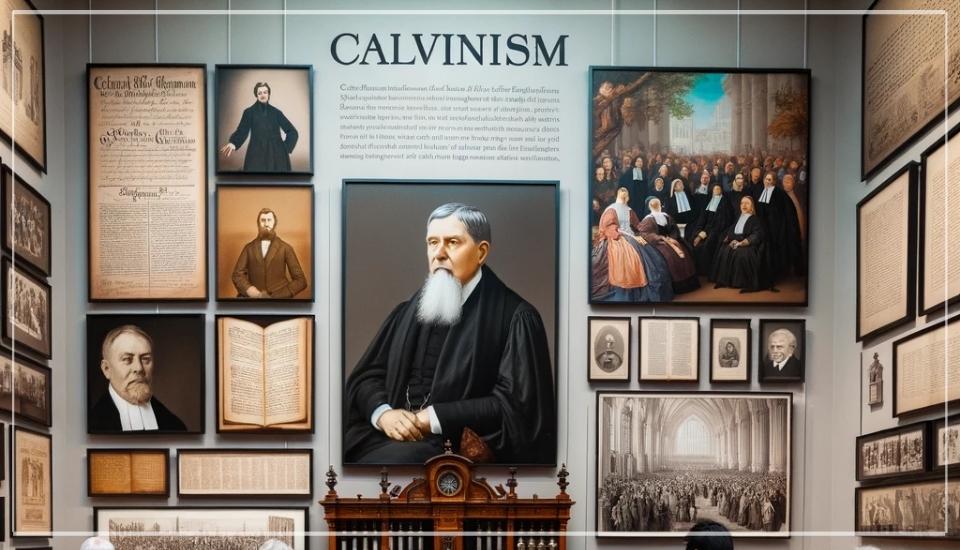What You’ll Learn
What Is The Concept of Total Depravity
Total Depravity is a theological doctrine stating that every aspect of human nature is corrupted by sin since Adam’s fall. It implies humans can’t achieve salvation without divine grace.
Key Takeaways: Total Depravity
- Total Depravity is a core concept in Calvinism and Reformed theology.
- Affects Every Part: Sin touches every aspect of our being since the fall of man.
- Humanity’s Sinful Nature: We inherit a sin nature from Adam, making us naturally sinful.
- Inability to Choose God: Without the grace of God, we are unable to turn to Him.
- John Calvin’s Influence: His teachings underscore our need for divine grace, echoed by theologians like John Piper.
- Foundation of TULIP: Total Depravity is the “T” in TULIP, influencing other doctrines like Unconditional Election and Irresistible Grace.
- Not Utter Depravity: It doesn’t mean we’re as bad as possible, but highlights our total inability without God.
- Subject to Debate: Faces critiques and alternative views in contemporary theology.
- Highlights Need for Grace: Emphasizes our complete dependence on God’s sovereign grace.
- Crucial for Theological Understanding: Understanding this doctrine is vital for broader discussions on sin, salvation, and humanity.
Digging Deeper Into Total Depravity
Total depravity refers to the theological belief that every part of human nature has been tainted by sin since the fall of Adam. Contrary to what some may assume, total depravity does not mean that humans are as sinful as they could possibly be, but rather that sin affects every aspect of our being, including our mind, will, emotions, and spirit.
Origin of the Concept
The idea of total depravity stems from the doctrine of original sin, which posits that the sin of Adam has passed on to the entire human race. This perspective can be traced back to early church fathers, particularly Augustine, who emphasized that humans are born into the world with a sin nature. Scriptures such as in Ephesians and Corinthians further elaborate on the state of humans being “dead in sin” and “enslave” to sinful tendencies.
Key Proponents of Total Depravity
Throughout history, many theologians have championed the doctrine of total depravity:
- John Calvin: A pivotal figure in the Reformation, Calvin was instrumental in emphasizing the total corrupt nature of humans and the need for sovereign grace. His teachings became foundational to Calvinism and the Five Points of Calvinism.
- John Piper: A contemporary theologian, Piper has spoken extensively on the topic, highlighting that “sin because we are sinners” and not the other way around.
- Augustine: As mentioned earlier, Augustine’s writings heavily influenced the church’s understanding of human nature’s sinful condition. He believed that since the fall, humans are in bondage to sin and cannot please God in their flesh.
In essence, the doctrine of total depravity underscores that man, by his nature, is unable to choose God or do good apart from the grace of God. This foundational belief shapes many other theological perspectives and discussions.
The Role of Total Depravity in Calvinism

Understanding Calvinism
Calvinism, a prominent branch of Protestant theology, places a heavy emphasis on the sovereignty of God in the process of salvation. Rooted in the teachings of John Calvin, this theological perspective is most famously represented by the acronym TULIP, which stands for the Five Points of Calvinism. Of these, the “T” represents “Total Depravity,” which asserts that sin has pervaded every part of human nature, rendering us incapable of coming to God without divine intervention.
How Total Depravity Fits Into the Five Points of Calvinism
Total depravity is the starting point of the TULIP framework and sets the stage for the other doctrines:
- Unconditional Election: Because humans are totally depraved and cannot choose God on their own, God elects some for salvation based on His sovereign will, not on any merit or action of the individual.
- Limited Atonement: Jesus’ sacrifice on the cross was intended specifically for those whom God has elected.
- Irresistible Grace: Those whom God has elected cannot resist His call to salvation.
- Perseverance of the Saints: Those who are truly elected by God will persevere in faith until the end.
This table summarizes the relationship:
| TULIP Point | Description |
|---|---|
| Total Depravity | Humans are entirely affected by sin and cannot come to God without grace. |
| Unconditional Election | God’s choice of certain individuals for salvation is not based on any foreseen merit or action on their part. |
| Limited Atonement | Christ’s death was intended for the elect, ensuring their salvation. |
| Irresistible Grace | The elect cannot resist God’s call to salvation. |
| Perseverance of the Saints | True believers will remain in faith, proving their genuine election. |
Relationship Between Total Depravity and the Other TULIP Doctrines
At its core, total depravity underscores the need for all the subsequent points in TULIP. By establishing that the entire human race is corrupted by sin, it highlights the necessity for a savior and God’s intervention.
The other doctrines in TULIP, such as unconditional election and irresistible grace, further emphasize the role of God’s sovereign grace over human will and ability in the process of salvation.
Without accepting the full weight of total depravity, the other points in Calvinism’s soteriological framework would lack their foundational basis.
The Implications of Total Depravity in Theology

The Impact of Total Depravity on Human Nature
The doctrine of total depravity profoundly shapes the Christian understanding of human nature. It asserts that every human, since the transgression in Eden, carries the sin nature of Adam. This means that every aspect of our being – thoughts, desires, actions, and even our very essence – is tainted by sin. Scriptures like the book of Jeremiah describe the human heart as “deceitful above all things and beyond cure.”
An essential implication here is that our sin isn’t merely a result of external influences or individual choices but is deeply embedded in our nature. Hence the phrase, “sin because we are sinners.” This perspective contrasts with secular views that often see humans as inherently good or neutral, shaped primarily by environment and experience.
The Necessity of Divine Grace in Salvation
Given this inherently sinful state, humans are unable to choose God or any genuine good on their own. This is where the grace of God becomes paramount. If we’re entirely corrupted by sin and enslaved to its desires, the only way out is through an external, divine intervention.
Ephesians makes this clear when it speaks of believers being “dead in trespasses and sins” but made alive through Christ. This underscores the belief that salvation is entirely a work of God, and humans cannot contribute to it by their merit or will.
The Tension Between Total Depravity and Free Will
One of the most debated topics in Christian theology is the tension between God’s sovereignty (as emphasized in doctrines like total depravity) and human free will. If humans are entirely corrupted by sin, to what extent can they exhibit genuine free will? Can a totally depraved individual make a genuine choice to follow God?
Calvinist perspectives, rooted in the belief of total depravity, often emphasize God’s predestining role in salvation, while other theological views might highlight human cooperation with God’s grace. This tension remains a point of discussion and debate among theologians and scholars, with various interpretations based on different biblical passages and theological traditions.
Debates Surrounding Total Depravity
Critiques of the concept
While the doctrine of total depravity is foundational in Calvinist theology, it has not been without its critics. Some argue that the doctrine paints too bleak a picture of human nature. They contend that while humans may be flawed or sinful, to label every aspect of human nature as totally depraved might be an overreach.
Another critique revolves around the interpretation of biblical texts. Critics question whether scriptures like Ephesians and Corinthians are indeed advocating a complete and total corruption of human nature or if they’re emphasizing humanity’s need for divine intervention without necessarily implying total corruption.
Alternative Perspectives on Human Nature and Sin
Several theological traditions offer alternative views to the Calvinist doctrine of total depravity:
- Arminianism: While agreeing that humans are tainted by sin, Arminians believe in prevenient grace, a divine grace that restores some degree of free will, allowing individuals to accept or reject God.
- Eastern Orthodoxy: Instead of focusing on inherited guilt from Adam’s sin, the Eastern Orthodox tradition emphasizes ancestral sin, which means humans inherit mortality and the inclination to sin, but not guilt.
- Pelagianism: A historically controversial view, Pelagianism denies the doctrine of original sin. It suggests that humans can choose to do good or evil without divine intervention.
| Theological Perspective | View on Human Nature and Sin |
|---|---|
| Calvinism | Humans are totally depraved and need divine grace for salvation. |
| Arminianism | Humans are sinful, but prevenient grace restores some free will. |
| Eastern Orthodoxy | Humans inherit the inclination to sin but not guilt. |
| Pelagianism | Humans can choose good or evil without divine intervention. |
Relevance of Total Depravity in Contemporary Theology
In the modern theological landscape, the doctrine of total depravity continues to be a point of discussion, especially in the context of debates about free will, predestination, and the nature of salvation.
While some contemporary theologians emphasize the doctrine as a reminder of humanity’s utter dependence on God’s grace, others seek a more nuanced understanding, blending scriptural interpretation with philosophical and existential considerations about human freedom, dignity, and the nature of evil.
Grace Ambassador: Bringing Heaven To Earth
As believers, we have received unimaginable grace from the Father. Unfortunately, we often separate our spiritual life from our everyday lives. We fail to value the grace given to us, and we miss the opportunity to bring heaven to earth. Then we wonder what light we can bring to a world in deep darkness.




